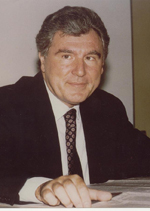Alessandro Nangeroni International Endowment
The Alessandro Nangeroni International Endowment is an endowment established in 2011 in memory of Alessandro Nangeroni.
Overview
A generous donation to the Michigan Center for Early Christian Studies by Gabriella Nangeroni established in 2011 the "Alessandro Nangeroni International Endowment" with the Enoch Seminar. The Endowment is aimed to support all activities of the Enoch Seminar. The Nangeroni Meetings, launched in 2012, were specifically created as a series of small-size international seminars devoted to the study of Jewish, Christian, and Islamic origins.
The "Fondo Nangeroni," a collections of books, journals, and publications that belonged to Alessandro Nangeroni, is housed at the Catholic University of Milan, Italy.
Official Biography of Alessandro Nangeroni
Alessandro Nangeroni was born in Milan, Italy on September 30, 1940 and died tragically in a car accident in Louisiana on August 3, 1999. He was a scholar of the Abrahamic religions, a journalist, a writer, and a University professor.
After he graduated with a degree in political science from the University of Milan, he embarked on a career in politics and journalism. And it was at the University of Milan in the 1970s when he first came in contact with Judaism as a student of Professor Modena.
He was a close collaborator of Attilio Agnoletto, Professor of Christian History at the University of Milan. Nangeroni was an indefatigable researcher, a great thinker, eager for truth and justice. Passionate about every idea that was also an ideal, he was open to dialogue, able to give warmth and hope. He was critical, but his criticism was always logical, analytical and constructive, Socratic.
Armed with this certainty, he loved human contact, especially conversation with young people. He had the gift of inspiring confidence with purity and honesty in meetings and dialogues between different peoples, cultures, and religions.
He devoted many years researching the common roots of Judaism and Christianity. In 1979 he spent a year at the University of Jerusalem deepening his knowledge of the Talmud, the Mishnah, and Kabbalah, giving seminars, writing essays, and publishing several volumes. The versatility of his interests, cultivated with a genuinely secular approach, yet respectful of the religious dimension, placed him in contact with scholars and leading members of the Christian, Jewish, and Islamic worlds.
In 1990 he collaborated with Cardinal Carlo Maria Martini for the famous dialogue "I and Islam." He had previously studied Islam, and in order to better understand its unique reality, he learned Arabic and moved for a few months to Damascus. Later, he wrote a dictionary of the Koran, which was welcomed by the Muslim community.
Nothing can better illustrate the saying of Terenzio, "Homo sum et nihil humanum me alienum puto " (I am a man and nothing human is alien to me) than the extraordinary versatility of the writings of Alessandro Nangeroni. He was a true and deep humanist, a clever provocateur, and an acute observer, who pursued the ultimate goal of reflecting on each person, in their completeness and complexity. In the 1990s, before an unmerciful and sudden death separated him from his studies, he taught courses and lectured in the United States at the Department of Literature of the University of California San Diego, at the Oriental Institute of the University of Chicago, and at the Research Center of Humanities and Oriental Studies at Columbia University in New York. For the year 2000 he had already signed a contract for a month at the Oriental Institute in Chicago.
Of his many interests he left a library of over 2,000 volumes. More than 700 books and about 400 journals in English, Hebrew, Arabic, and Italian have been presented to the Central Library of the Catholic University of Milan to form the "Fondo Nangeroni." In 2011 the Alexander Nangeroni International Endowment was created at the Michigan Center for Early Christian Studies to support the international activities of the Enoch Seminar and the Department of Near Eastern Studies at the University of Michigan.
